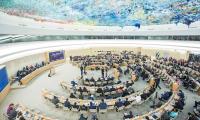The role of national human rights institutions in realising the SDGs

As stated in the 2030 Agenda for Sustainable Development, the Sustainable Development Goals (SDGs) “seek to realise human rights of all”. Given the mutually reinforcing nature of human rights and sustainable development, NHRIs across the world play a unique role in realising the SDGs through their mandate and actions to protect and promote human rights.
The critical contribution of NHRIs has also been acknowledged by the General Assembly and the Human Rights Council (HRC). This week, on Thursday the 7th of February, The Council will host a half-day session to focus on the key role of NHRIs as enabler for the realisation of the 2030 Agenda.
The Danish Institute for Human Rights (DIHR) will be represented by Birgitte Feiring, Department Director for Human Rights and Development, who will act as rapporteur of the session to sum up conclusions and recommendations.
Time for action
The existence of a fully independent A-status NHRI is an official indicator for the realisation of SDG 16 on Peace, Justice and Strong Institutions. This emphasises the importance of NHRIs and their contribution to the 2030 Agenda.
In connection with the upcoming meeting, the Institute and the Global Alliance of Human Rights Institutions (GANHRI) have prepared a report on the role of NHRIs and their contributions to the SDGs.
A key finding is that higher ambitions are needed to ensure that all 193 UN member states will have an independent A-status NHRI by 2030. Currently, 39% have an A-status NHRI, and while the overall trend is positive, that figure will only increase to 54% of all UN member states by 2030 with the current pace.
